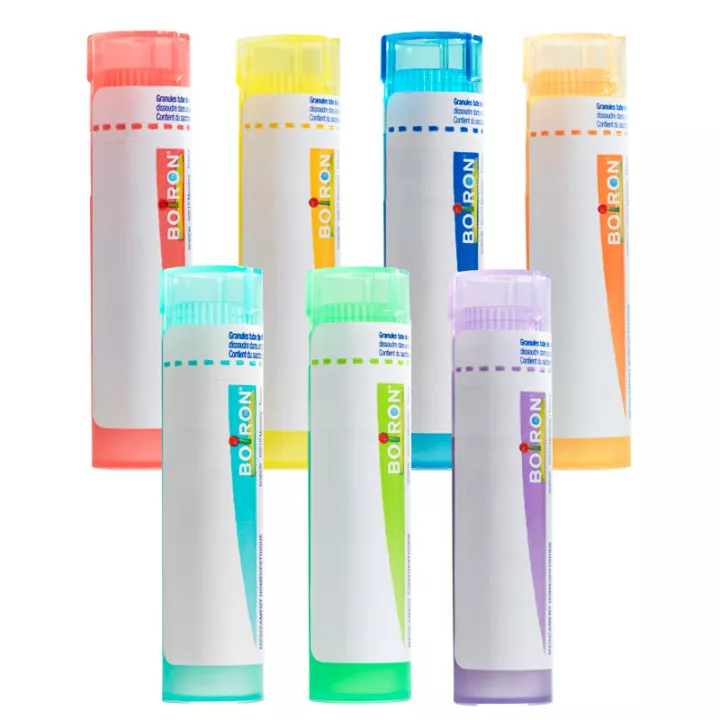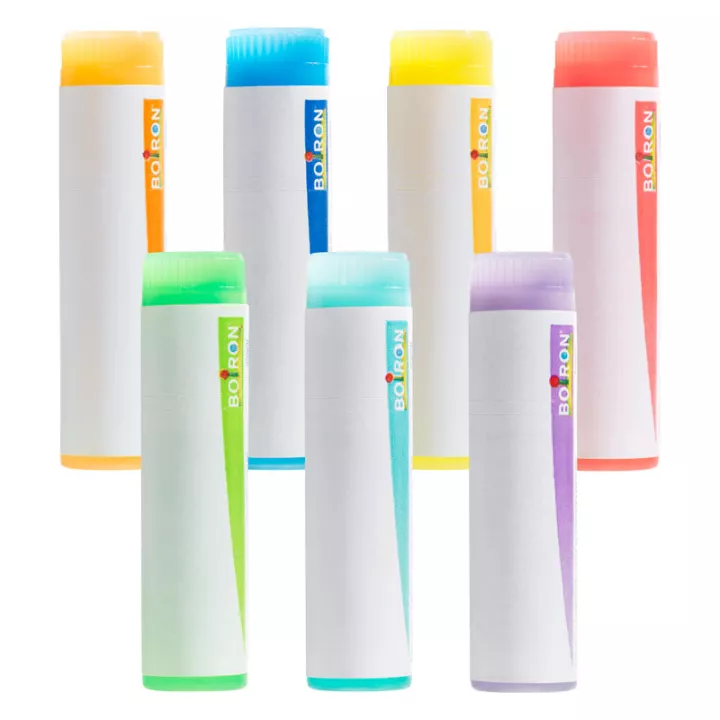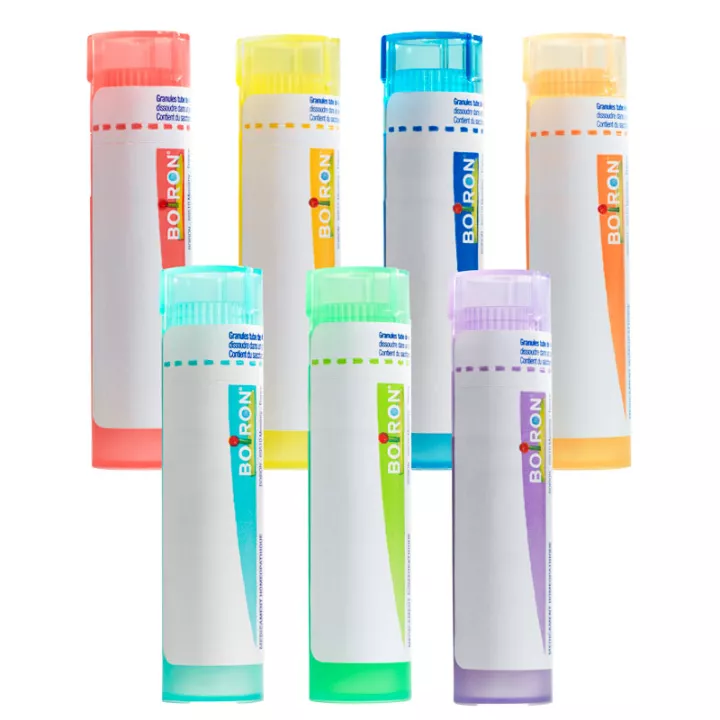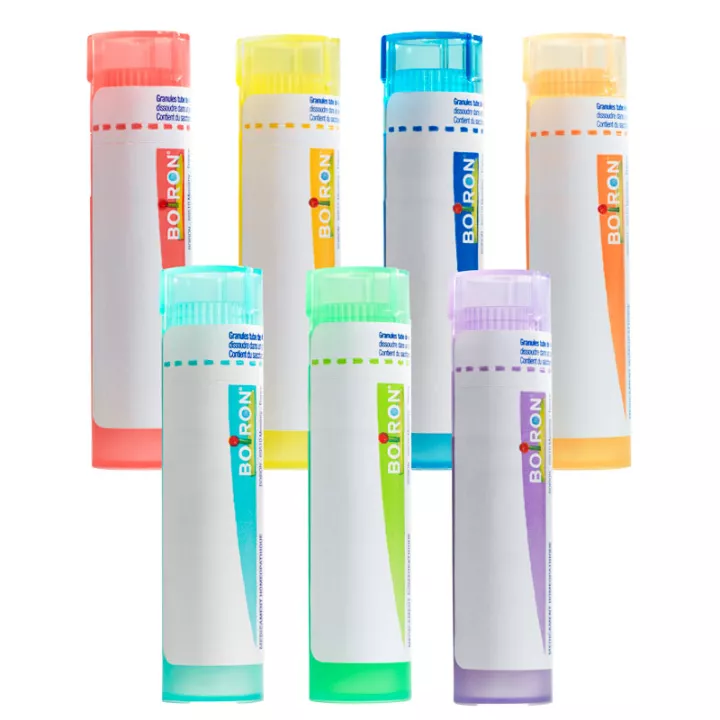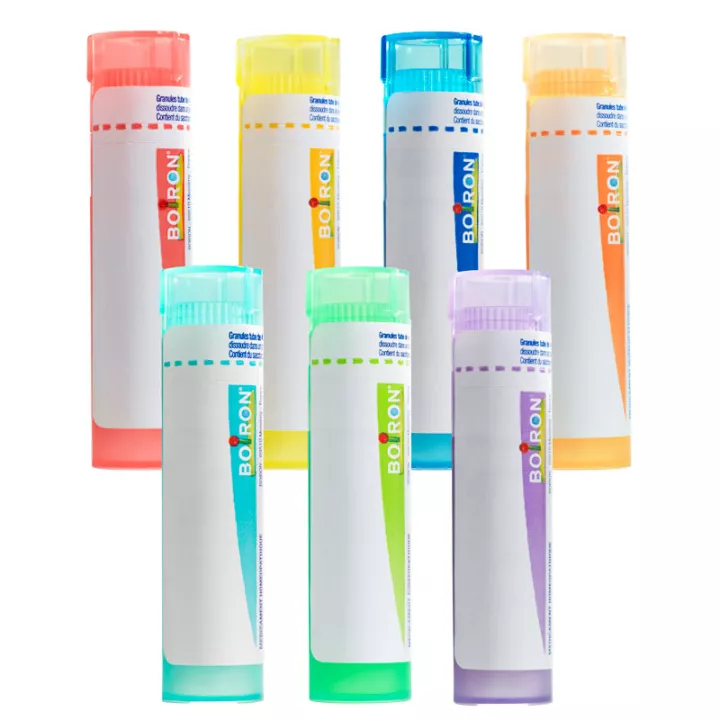Benzoicum Acidum 4CH, 5CH, 7CH, 9CH Granules homéopathie Boiron
Discover Benzoicum Acidum 4CH, 5CH, 7CH, 9CH, the versatile homeopathic remedy for cystitis, infantile enuresis, hyperuricemia, gout attacks and joint pain. Opt for a natural approach to your well-being in urology and rheumatology.
Benzoic acid is a mainstay of modern homeopathy. Thanks to its availability in various forms and dilutions, and its inclusion in the French and European pharmacopoeias, this compound offers a solid basis for the homeopathic treatment of many conditions. Its synthetic origin guarantees consistent quality and purity, making benzoic acid a preferred choice among practitioners and patients seeking safe, effective medicinal alternatives.
Indications and dosage
Homeopathic medicines in tubular granules or globular doses can be used for a variety of symptoms, so it's not possible to determine the indications and dosage of a specific preparation.
The homeopathic physician selects the appropriate medicine, dilution and dosage according to the patient's state of health and characteristic symptoms.
Benzoicum Acidum 4CH, 5CH, 7CH, 9CH: Homeopathy for Urology and Rheumatology
A versatile homeopathic solution
Benzoicum Acidum 4CH, 5CH, 7CH, 9CH Tube Granules is a homeopathic medicine commonly used in urology and rheumatology. Explore the many applications of this unique remedy and discover how it can improve your well-being in these key health areas.
In Urology: Fight Cystitis and Infantile Enuresis
Cystitis is an unpleasant urinary tract infection, whileinfantile enuresis can be a source of frustration for children and their parents. Benzoicum Acidum 4CH, 5CH, 7CH, 9CH offers a homeopathic solution for these conditions. In cases of cystitis and infantile enuresis, this medicine can provide relief by alleviating symptoms and promoting recovery. Opt for a natural approach to urinary health.
Rheumatology: Relief of gout attacks and joint pain
Hyperuricemia can lead to painful gout attacks and joint pain. Benzoicum Acidum 4CH, 5CH, 7CH, 9CH is a homeopathic remedy that can help manage these conditions. By taking this medicine in the morning on an empty stomach and in the evening before going to bed, you can effectively relieve the pain caused by these rheumatological conditions. Opt for joint comfort with Benzoicum Acidum.
Dosage varies according to indication:
- To treat infantile enuresis: take 3 granules of Benzoicum Acidum 9CH three times a day.
- For hyperuricemia or gout attacks: take 3 granules of Benzoicum Acidum 9CH, in the morning on an empty stomach and in the evening before going to bed. Pain associated with the disease should be relieved as soon as treatment begins.
Choose Benzoicum Acidum 4CH, 5CH, 7CH, 9CH for a natural approach to urological and rheumatological health.
Directions for use
For best results, follow these recommendations:
- Invert and twist the cap to remove the granules from the tube.
- Do not place the granules in the palm of the hand to administer.
- For adults and children over 6, allow to melt under the tongue.
- For children under 6, dissolve granules in a little water.
- Do not take astringent substances within half an hour of taking homeopathic medicines such as coffee, tobacco, camphor, mint and chamomile.
- Use a mint-free toothpaste (such as Homéodent Boiron, which is compatible with homeopathic granules).
Packaging and contents
- Translucent granule tube (for easy viewing of remaining granules). Weight 4g. Approx. 80 granules.
- Single-dose tube of translucent globules (visualization of remaining granules). Weight 1g.
Benzoic acid is an organic compound that plays a crucial role in homeopathy. Available in several forms, this element is included in the French and European pharmacopoeia, testifying to its importance and widespread use in the treatment of various ailments.
Characteristics and available forms
Benzoic acid is available in a variety of presentations to meet the specific needs of each patient. Whether in doses, tubes or magistral preparations, this compound offers remarkable flexibility of use. The dilutions available vary, allowing treatment to be personalized according to homeopathic principles.
Origin and certification
Synthesized to guarantee optimum purity and efficacy, benzoic acid is registered in both the French and European pharmacopoeias. This dual recognition underlines the compound's compliance with the quality and safety standards required for medicinal substances on European territory.
Registration and accessibility
Identified under registration number EH00029, benzoic acid is easily accessible to healthcare professionals. Homeopathic medicines containing this compound, notably those offered by the BOIRON laboratory, cover a wide range of dilutions, from 2 CH to 15 CH. This diversity means that homeopathic treatments can be developed with great precision.
Hahnemannian dilutions: Therapeutic precision
Benzoic acid preparations follow the principles of Hahnemannian dilutions, based on the teachings of German physician Samuel Hahnemann. This dilutive method enables treatment to be tailored to the individual, favoring a personalized approach that respects the patient's physiology.
Precautions for use
Warning
Contains sacchararose. Keep homeopathic medicines away from light, heat, humidity and all sources of fumes and fragrances.
Giving homeopathic granules to babies and children
For granules or alcoholic drops, dissolve in 100ml of water. Granules take a very long time to dissolve, so you'll need to prepare your mixture in advance.
Homeopathy and pregnancy
Homeopathic medicines have no chemical toxicity, no contraindications, no interaction with other drugs, and no adverse effects linked to the quantity of product ingested. Pregnant women can take homeopathic medicines without any known risk to themselves or their unborn child, but it is advisable to seek advice.
Frequency of homeopathic use
For acute conditions, homeopathic remedies should be taken every hour until symptoms improve. From then on, they should be taken 3 or 4 times a day, spaced out, and then gradually stopped.
For chronic conditions, low-dilution remedies (> 9CH) should be taken 1 or 2 times a day, while basic remedies should be taken once a week, or even once a month. This decision is left to the homeopath.
What to do if there is no improvement within 24 hours
Certain pathologies cannot be treated with homeopathy simply by self-medication. Their severity requires medical advice from a homeopathic doctor. This doctor will judge whether your condition can be treated with homeopathy alone, or whether your treatment needs to be supplemented with allopathic medicine.

